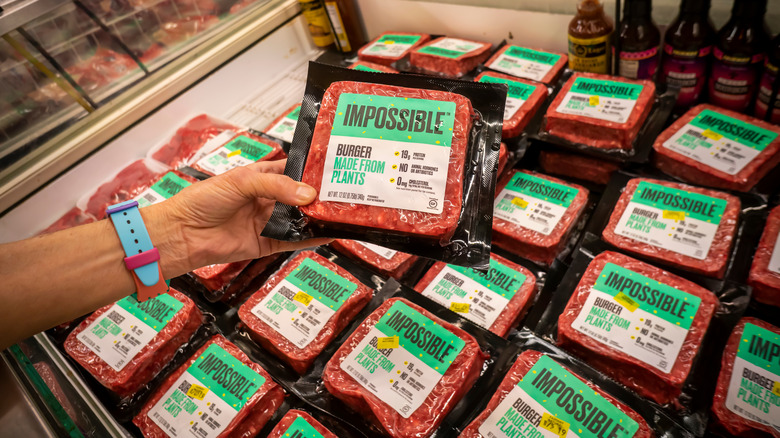The Surprising Reason Impossible Foods' Pork Isn't Kosher-Certified
Have you ever tried an Impossible Foods burger, sausage, or "chicken" nugget? If so, you'll know that these plant-based meat products made primarily from soy protein concentrate have been lauded for their ability to mimic the juiciness and texture of real meat, making them a favorite among vegetarians (via Above Data). Observant Jews are especially fond of Impossible Foods. According to the Jewish Telegraphic Agency (JTA), observant Jews eat kosher because they follow dietary laws that forbid them from mixing meat products with milk products in the same meal. However, imitation meat like Impossible allows for a broader range of experimentation in the kitchen. For example, cheese "burgers" with real cheese and imitation meat that taste pretty close to the real deal are fair game for observant Jews.
Kosher or Muslim halal diets forbid another popular food: pork, in all its forms, which in the Bible's Old Testament is referred to as "unclean," according to the Spokesman-Review. That means that for observant Jews, everything from bacon to short ribs to ham is not on the menu.
Last fall, Impossible Foods released ground "pork," with which, according to JTA, the company hoped to satisfy the forbidden pork cravings of those who adhere to a kosher diet. But even though the product is entirely free of animal protein, the Orthodox Union, the world's largest kosher certifier, chose not to deem the "pork" kosher. Read on to find out why not.
Kosher pork goes against the spirit of the law, not the letter
If you know anything at all about kosher dietary rules, then you'll know that the idea of kosher pork is an oxymoron. The Old Testament refers to meat from pigs as "unclean," along with other specific proteins such as shellfish and rabbit. This means that foods considered unclean cannot be consumed on a kosher (or halal) diet. The idea of eating pork is so incompatible with a kosher diet that the Orthodox Union (OU) decided not to grant its kosher certification to Impossible Foods pork when it hit the market last September.
"We didn't give an 'OU' to it, not because it wasn't kosher per se," Rabbi Menachem Genack, CEO of the OU's kosher division, told the JTA. "It may indeed be completely in terms of its ingredients. If it's completely plant-derived, it's kosher. Just in terms of sensitivities to the consumer...it didn't get it."
Genack recalled when the OU had chosen to certify imitation "bacon." Consumers were so unhappy with the idea of consuming "bacon" that tons of disgruntled kosher-observant folks called in to the OU to complain. "We still get deluged with calls from consumers who either don't get it, or they're uncomfortable with it," Genack told JTA.
But some kosher eaters might still choose to indulge in Impossible Pork
While the Orthodox Union declined to give the go-ahead to Impossible Pork, consumers are free to utilize discretion when making dietary choices. Rabbi Justin Held, director of Jewish education at the University of Minnesota's Hillel, told the JTA that he feels comfortable consuming it since Impossible Pork contains no meat or pork. "I don't think the OU labeling on it has a huge impact on me."
In the past, the OU has required restaurants or products seeking kosher certification to change their names or product imagery to "seem" more kosher and gain certification. And while certification would potentially expand the Impossible Foods customer base, the brand told the JTA that it has no plans to change its name or concept, a spokesperson wrote in an email.
"While Impossible Pork was originally designed for Halal and Kosher certification, we aren't moving forward with those certifications as we wish to continue to use the term 'Pork' in our product name."


